How Applicable is Polanyi's 'Double Movement' Today? Essay
VerifiedAdded on 2022/01/27
|5
|2466
|73
Essay
AI Summary
This essay critically examines the applicability of Karl Polanyi's 'double movement' theory to the contemporary global political economy. It begins by exploring the challenges in applying Polanyi's framework, particularly his limited recognition of hegemonic power, specifically the role of the United States in shaping neoliberal economic policies through international organizations like the IMF and WTO. The essay then asserts the continued relevance of the 'double movement' by analyzing the countermovements against market society's harms, such as protectionist policies, human rights protections, and the rise of social and socialist politics. The analysis highlights how the actions of the United States and the policies of international institutions have demonstrated the double movement's influence on the global economy, concluding that despite the dominance of hegemonic powers, Polanyi's theory offers valuable insights into the dynamics between market expansion and societal resistance.
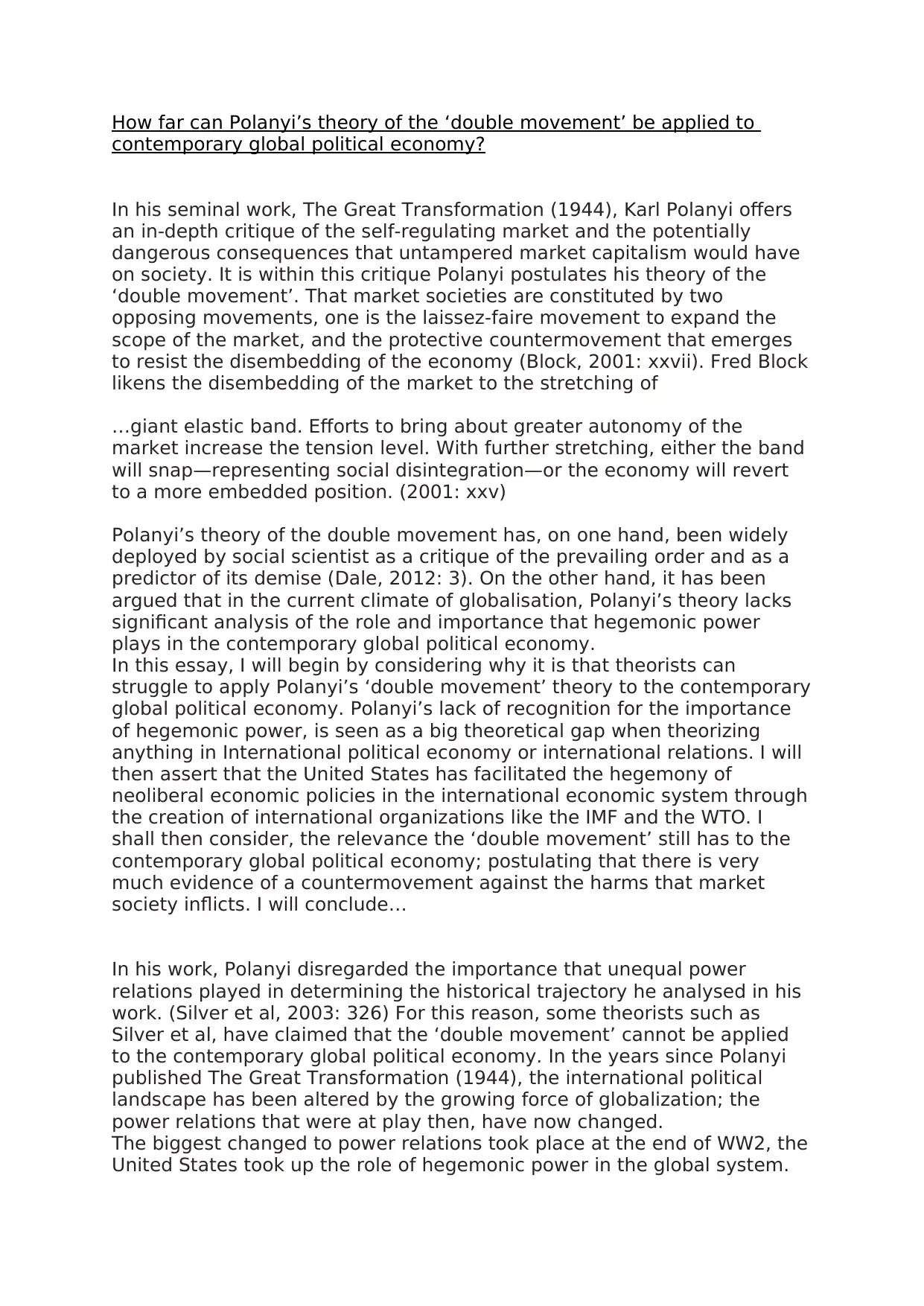
How far can Polanyi’s theory of the ‘double movement’ be applied to
contemporary global political economy?
In his seminal work, The Great Transformation (1944), Karl Polanyi offers
an in-depth critique of the self-regulating market and the potentially
dangerous consequences that untampered market capitalism would have
on society. It is within this critique Polanyi postulates his theory of the
‘double movement’. That market societies are constituted by two
opposing movements, one is the laissez-faire movement to expand the
scope of the market, and the protective countermovement that emerges
to resist the disembedding of the economy (Block, 2001: xxvii). Fred Block
likens the disembedding of the market to the stretching of
…giant elastic band. Efforts to bring about greater autonomy of the
market increase the tension level. With further stretching, either the band
will snap—representing social disintegration—or the economy will revert
to a more embedded position. (2001: xxv)
Polanyi’s theory of the double movement has, on one hand, been widely
deployed by social scientist as a critique of the prevailing order and as a
predictor of its demise (Dale, 2012: 3). On the other hand, it has been
argued that in the current climate of globalisation, Polanyi’s theory lacks
significant analysis of the role and importance that hegemonic power
plays in the contemporary global political economy.
In this essay, I will begin by considering why it is that theorists can
struggle to apply Polanyi’s ‘double movement’ theory to the contemporary
global political economy. Polanyi’s lack of recognition for the importance
of hegemonic power, is seen as a big theoretical gap when theorizing
anything in International political economy or international relations. I will
then assert that the United States has facilitated the hegemony of
neoliberal economic policies in the international economic system through
the creation of international organizations like the IMF and the WTO. I
shall then consider, the relevance the ‘double movement’ still has to the
contemporary global political economy; postulating that there is very
much evidence of a countermovement against the harms that market
society inflicts. I will conclude…
In his work, Polanyi disregarded the importance that unequal power
relations played in determining the historical trajectory he analysed in his
work. (Silver et al, 2003: 326) For this reason, some theorists such as
Silver et al, have claimed that the ‘double movement’ cannot be applied
to the contemporary global political economy. In the years since Polanyi
published The Great Transformation (1944), the international political
landscape has been altered by the growing force of globalization; the
power relations that were at play then, have now changed.
The biggest changed to power relations took place at the end of WW2, the
United States took up the role of hegemonic power in the global system.
contemporary global political economy?
In his seminal work, The Great Transformation (1944), Karl Polanyi offers
an in-depth critique of the self-regulating market and the potentially
dangerous consequences that untampered market capitalism would have
on society. It is within this critique Polanyi postulates his theory of the
‘double movement’. That market societies are constituted by two
opposing movements, one is the laissez-faire movement to expand the
scope of the market, and the protective countermovement that emerges
to resist the disembedding of the economy (Block, 2001: xxvii). Fred Block
likens the disembedding of the market to the stretching of
…giant elastic band. Efforts to bring about greater autonomy of the
market increase the tension level. With further stretching, either the band
will snap—representing social disintegration—or the economy will revert
to a more embedded position. (2001: xxv)
Polanyi’s theory of the double movement has, on one hand, been widely
deployed by social scientist as a critique of the prevailing order and as a
predictor of its demise (Dale, 2012: 3). On the other hand, it has been
argued that in the current climate of globalisation, Polanyi’s theory lacks
significant analysis of the role and importance that hegemonic power
plays in the contemporary global political economy.
In this essay, I will begin by considering why it is that theorists can
struggle to apply Polanyi’s ‘double movement’ theory to the contemporary
global political economy. Polanyi’s lack of recognition for the importance
of hegemonic power, is seen as a big theoretical gap when theorizing
anything in International political economy or international relations. I will
then assert that the United States has facilitated the hegemony of
neoliberal economic policies in the international economic system through
the creation of international organizations like the IMF and the WTO. I
shall then consider, the relevance the ‘double movement’ still has to the
contemporary global political economy; postulating that there is very
much evidence of a countermovement against the harms that market
society inflicts. I will conclude…
In his work, Polanyi disregarded the importance that unequal power
relations played in determining the historical trajectory he analysed in his
work. (Silver et al, 2003: 326) For this reason, some theorists such as
Silver et al, have claimed that the ‘double movement’ cannot be applied
to the contemporary global political economy. In the years since Polanyi
published The Great Transformation (1944), the international political
landscape has been altered by the growing force of globalization; the
power relations that were at play then, have now changed.
The biggest changed to power relations took place at the end of WW2, the
United States took up the role of hegemonic power in the global system.
Paraphrase This Document
Need a fresh take? Get an instant paraphrase of this document with our AI Paraphraser
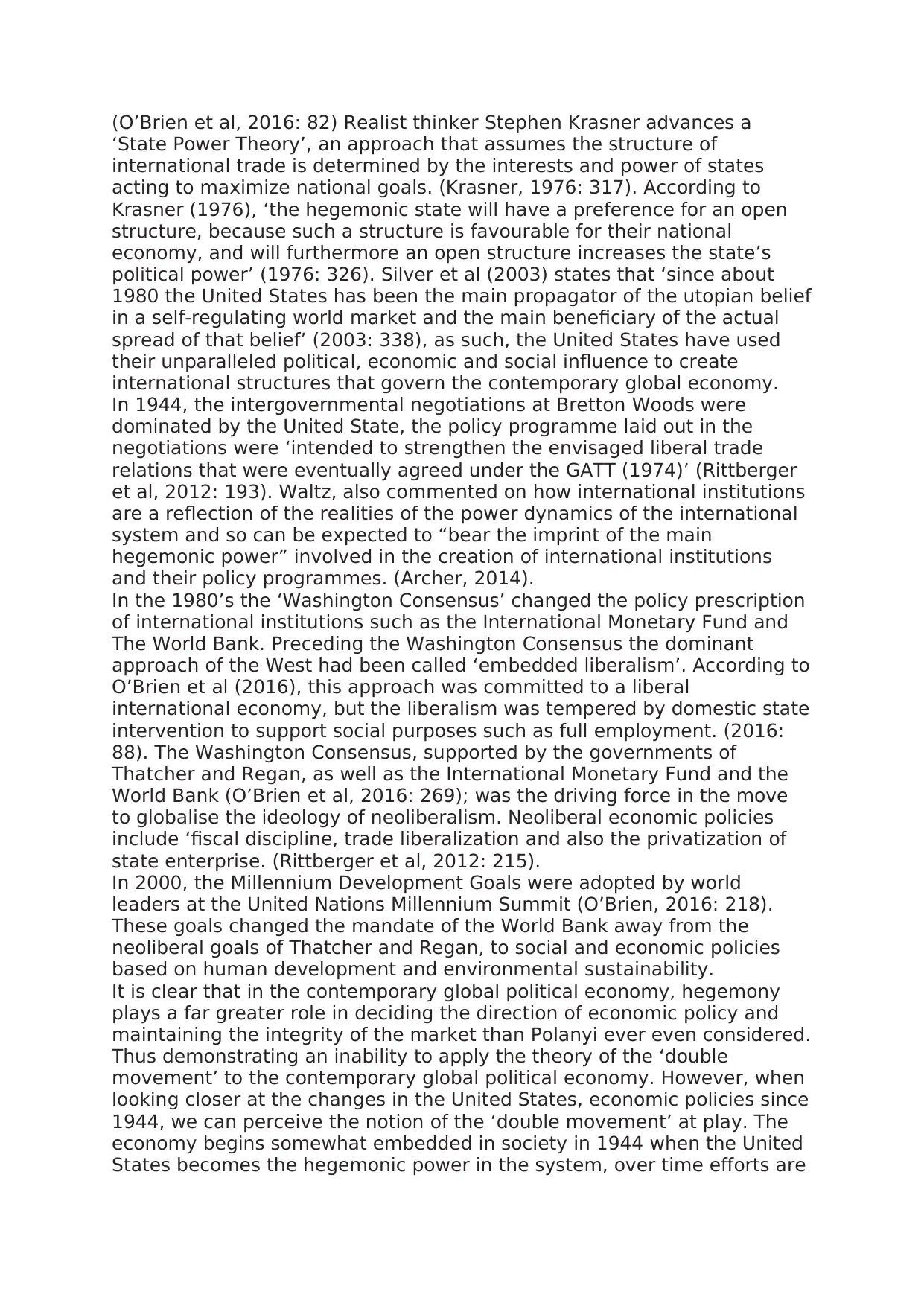
(O’Brien et al, 2016: 82) Realist thinker Stephen Krasner advances a
‘State Power Theory’, an approach that assumes the structure of
international trade is determined by the interests and power of states
acting to maximize national goals. (Krasner, 1976: 317). According to
Krasner (1976), ‘the hegemonic state will have a preference for an open
structure, because such a structure is favourable for their national
economy, and will furthermore an open structure increases the state’s
political power’ (1976: 326). Silver et al (2003) states that ‘since about
1980 the United States has been the main propagator of the utopian belief
in a self-regulating world market and the main beneficiary of the actual
spread of that belief’ (2003: 338), as such, the United States have used
their unparalleled political, economic and social influence to create
international structures that govern the contemporary global economy.
In 1944, the intergovernmental negotiations at Bretton Woods were
dominated by the United State, the policy programme laid out in the
negotiations were ‘intended to strengthen the envisaged liberal trade
relations that were eventually agreed under the GATT (1974)’ (Rittberger
et al, 2012: 193). Waltz, also commented on how international institutions
are a reflection of the realities of the power dynamics of the international
system and so can be expected to “bear the imprint of the main
hegemonic power” involved in the creation of international institutions
and their policy programmes. (Archer, 2014).
In the 1980’s the ‘Washington Consensus’ changed the policy prescription
of international institutions such as the International Monetary Fund and
The World Bank. Preceding the Washington Consensus the dominant
approach of the West had been called ‘embedded liberalism’. According to
O’Brien et al (2016), this approach was committed to a liberal
international economy, but the liberalism was tempered by domestic state
intervention to support social purposes such as full employment. (2016:
88). The Washington Consensus, supported by the governments of
Thatcher and Regan, as well as the International Monetary Fund and the
World Bank (O’Brien et al, 2016: 269); was the driving force in the move
to globalise the ideology of neoliberalism. Neoliberal economic policies
include ‘fiscal discipline, trade liberalization and also the privatization of
state enterprise. (Rittberger et al, 2012: 215).
In 2000, the Millennium Development Goals were adopted by world
leaders at the United Nations Millennium Summit (O’Brien, 2016: 218).
These goals changed the mandate of the World Bank away from the
neoliberal goals of Thatcher and Regan, to social and economic policies
based on human development and environmental sustainability.
It is clear that in the contemporary global political economy, hegemony
plays a far greater role in deciding the direction of economic policy and
maintaining the integrity of the market than Polanyi ever even considered.
Thus demonstrating an inability to apply the theory of the ‘double
movement’ to the contemporary global political economy. However, when
looking closer at the changes in the United States, economic policies since
1944, we can perceive the notion of the ‘double movement’ at play. The
economy begins somewhat embedded in society in 1944 when the United
States becomes the hegemonic power in the system, over time efforts are
‘State Power Theory’, an approach that assumes the structure of
international trade is determined by the interests and power of states
acting to maximize national goals. (Krasner, 1976: 317). According to
Krasner (1976), ‘the hegemonic state will have a preference for an open
structure, because such a structure is favourable for their national
economy, and will furthermore an open structure increases the state’s
political power’ (1976: 326). Silver et al (2003) states that ‘since about
1980 the United States has been the main propagator of the utopian belief
in a self-regulating world market and the main beneficiary of the actual
spread of that belief’ (2003: 338), as such, the United States have used
their unparalleled political, economic and social influence to create
international structures that govern the contemporary global economy.
In 1944, the intergovernmental negotiations at Bretton Woods were
dominated by the United State, the policy programme laid out in the
negotiations were ‘intended to strengthen the envisaged liberal trade
relations that were eventually agreed under the GATT (1974)’ (Rittberger
et al, 2012: 193). Waltz, also commented on how international institutions
are a reflection of the realities of the power dynamics of the international
system and so can be expected to “bear the imprint of the main
hegemonic power” involved in the creation of international institutions
and their policy programmes. (Archer, 2014).
In the 1980’s the ‘Washington Consensus’ changed the policy prescription
of international institutions such as the International Monetary Fund and
The World Bank. Preceding the Washington Consensus the dominant
approach of the West had been called ‘embedded liberalism’. According to
O’Brien et al (2016), this approach was committed to a liberal
international economy, but the liberalism was tempered by domestic state
intervention to support social purposes such as full employment. (2016:
88). The Washington Consensus, supported by the governments of
Thatcher and Regan, as well as the International Monetary Fund and the
World Bank (O’Brien et al, 2016: 269); was the driving force in the move
to globalise the ideology of neoliberalism. Neoliberal economic policies
include ‘fiscal discipline, trade liberalization and also the privatization of
state enterprise. (Rittberger et al, 2012: 215).
In 2000, the Millennium Development Goals were adopted by world
leaders at the United Nations Millennium Summit (O’Brien, 2016: 218).
These goals changed the mandate of the World Bank away from the
neoliberal goals of Thatcher and Regan, to social and economic policies
based on human development and environmental sustainability.
It is clear that in the contemporary global political economy, hegemony
plays a far greater role in deciding the direction of economic policy and
maintaining the integrity of the market than Polanyi ever even considered.
Thus demonstrating an inability to apply the theory of the ‘double
movement’ to the contemporary global political economy. However, when
looking closer at the changes in the United States, economic policies since
1944, we can perceive the notion of the ‘double movement’ at play. The
economy begins somewhat embedded in society in 1944 when the United
States becomes the hegemonic power in the system, over time efforts are
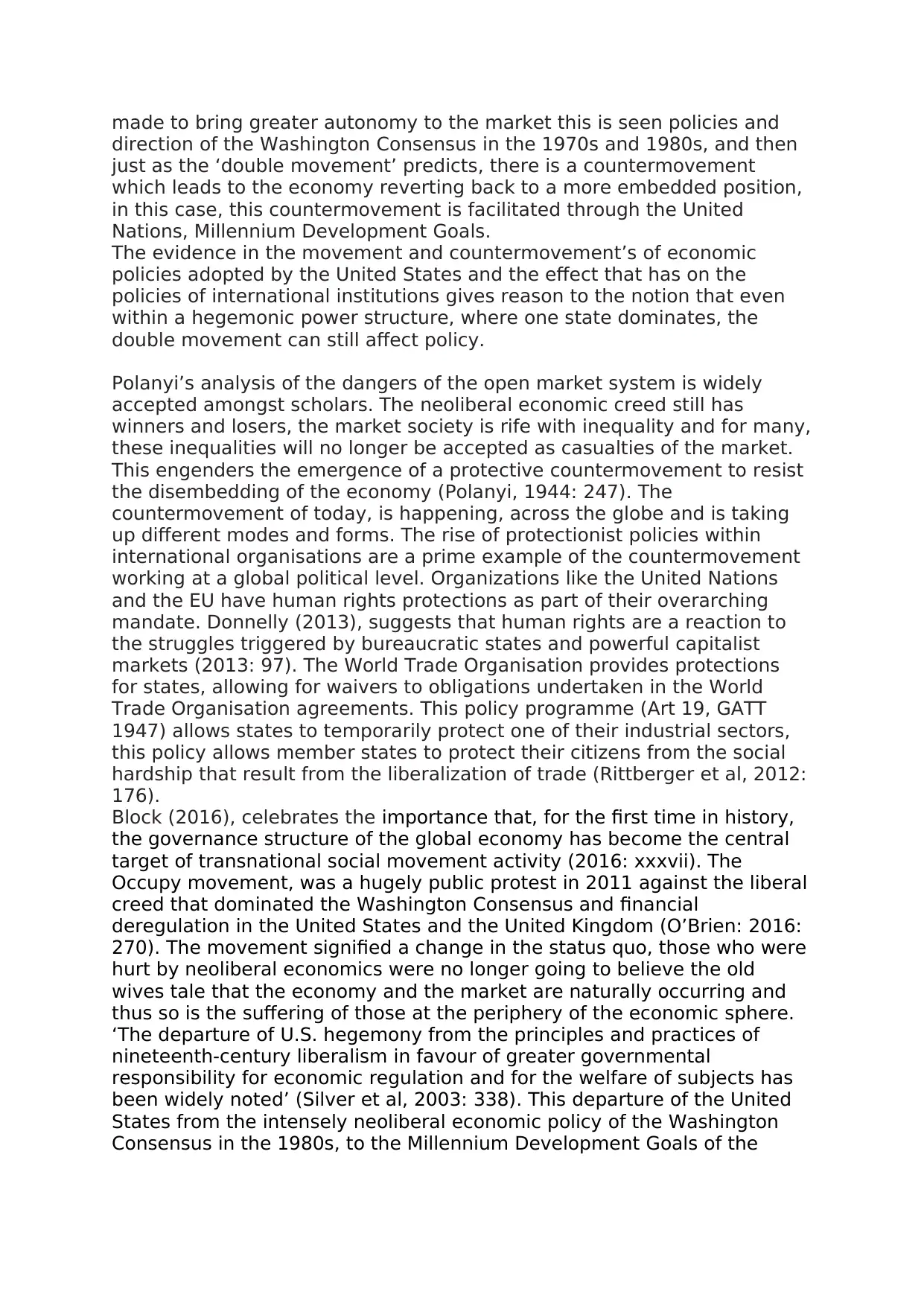
made to bring greater autonomy to the market this is seen policies and
direction of the Washington Consensus in the 1970s and 1980s, and then
just as the ‘double movement’ predicts, there is a countermovement
which leads to the economy reverting back to a more embedded position,
in this case, this countermovement is facilitated through the United
Nations, Millennium Development Goals.
The evidence in the movement and countermovement’s of economic
policies adopted by the United States and the effect that has on the
policies of international institutions gives reason to the notion that even
within a hegemonic power structure, where one state dominates, the
double movement can still affect policy.
Polanyi’s analysis of the dangers of the open market system is widely
accepted amongst scholars. The neoliberal economic creed still has
winners and losers, the market society is rife with inequality and for many,
these inequalities will no longer be accepted as casualties of the market.
This engenders the emergence of a protective countermovement to resist
the disembedding of the economy (Polanyi, 1944: 247). The
countermovement of today, is happening, across the globe and is taking
up different modes and forms. The rise of protectionist policies within
international organisations are a prime example of the countermovement
working at a global political level. Organizations like the United Nations
and the EU have human rights protections as part of their overarching
mandate. Donnelly (2013), suggests that human rights are a reaction to
the struggles triggered by bureaucratic states and powerful capitalist
markets (2013: 97). The World Trade Organisation provides protections
for states, allowing for waivers to obligations undertaken in the World
Trade Organisation agreements. This policy programme (Art 19, GATT
1947) allows states to temporarily protect one of their industrial sectors,
this policy allows member states to protect their citizens from the social
hardship that result from the liberalization of trade (Rittberger et al, 2012:
176).
Block (2016), celebrates the importance that, for the first time in history,
the governance structure of the global economy has become the central
target of transnational social movement activity (2016: xxxvii). The
Occupy movement, was a hugely public protest in 2011 against the liberal
creed that dominated the Washington Consensus and financial
deregulation in the United States and the United Kingdom (O’Brien: 2016:
270). The movement signified a change in the status quo, those who were
hurt by neoliberal economics were no longer going to believe the old
wives tale that the economy and the market are naturally occurring and
thus so is the suffering of those at the periphery of the economic sphere.
‘The departure of U.S. hegemony from the principles and practices of
nineteenth-century liberalism in favour of greater governmental
responsibility for economic regulation and for the welfare of subjects has
been widely noted’ (Silver et al, 2003: 338). This departure of the United
States from the intensely neoliberal economic policy of the Washington
Consensus in the 1980s, to the Millennium Development Goals of the
direction of the Washington Consensus in the 1970s and 1980s, and then
just as the ‘double movement’ predicts, there is a countermovement
which leads to the economy reverting back to a more embedded position,
in this case, this countermovement is facilitated through the United
Nations, Millennium Development Goals.
The evidence in the movement and countermovement’s of economic
policies adopted by the United States and the effect that has on the
policies of international institutions gives reason to the notion that even
within a hegemonic power structure, where one state dominates, the
double movement can still affect policy.
Polanyi’s analysis of the dangers of the open market system is widely
accepted amongst scholars. The neoliberal economic creed still has
winners and losers, the market society is rife with inequality and for many,
these inequalities will no longer be accepted as casualties of the market.
This engenders the emergence of a protective countermovement to resist
the disembedding of the economy (Polanyi, 1944: 247). The
countermovement of today, is happening, across the globe and is taking
up different modes and forms. The rise of protectionist policies within
international organisations are a prime example of the countermovement
working at a global political level. Organizations like the United Nations
and the EU have human rights protections as part of their overarching
mandate. Donnelly (2013), suggests that human rights are a reaction to
the struggles triggered by bureaucratic states and powerful capitalist
markets (2013: 97). The World Trade Organisation provides protections
for states, allowing for waivers to obligations undertaken in the World
Trade Organisation agreements. This policy programme (Art 19, GATT
1947) allows states to temporarily protect one of their industrial sectors,
this policy allows member states to protect their citizens from the social
hardship that result from the liberalization of trade (Rittberger et al, 2012:
176).
Block (2016), celebrates the importance that, for the first time in history,
the governance structure of the global economy has become the central
target of transnational social movement activity (2016: xxxvii). The
Occupy movement, was a hugely public protest in 2011 against the liberal
creed that dominated the Washington Consensus and financial
deregulation in the United States and the United Kingdom (O’Brien: 2016:
270). The movement signified a change in the status quo, those who were
hurt by neoliberal economics were no longer going to believe the old
wives tale that the economy and the market are naturally occurring and
thus so is the suffering of those at the periphery of the economic sphere.
‘The departure of U.S. hegemony from the principles and practices of
nineteenth-century liberalism in favour of greater governmental
responsibility for economic regulation and for the welfare of subjects has
been widely noted’ (Silver et al, 2003: 338). This departure of the United
States from the intensely neoliberal economic policy of the Washington
Consensus in the 1980s, to the Millennium Development Goals of the
⊘ This is a preview!⊘
Do you want full access?
Subscribe today to unlock all pages.

Trusted by 1+ million students worldwide
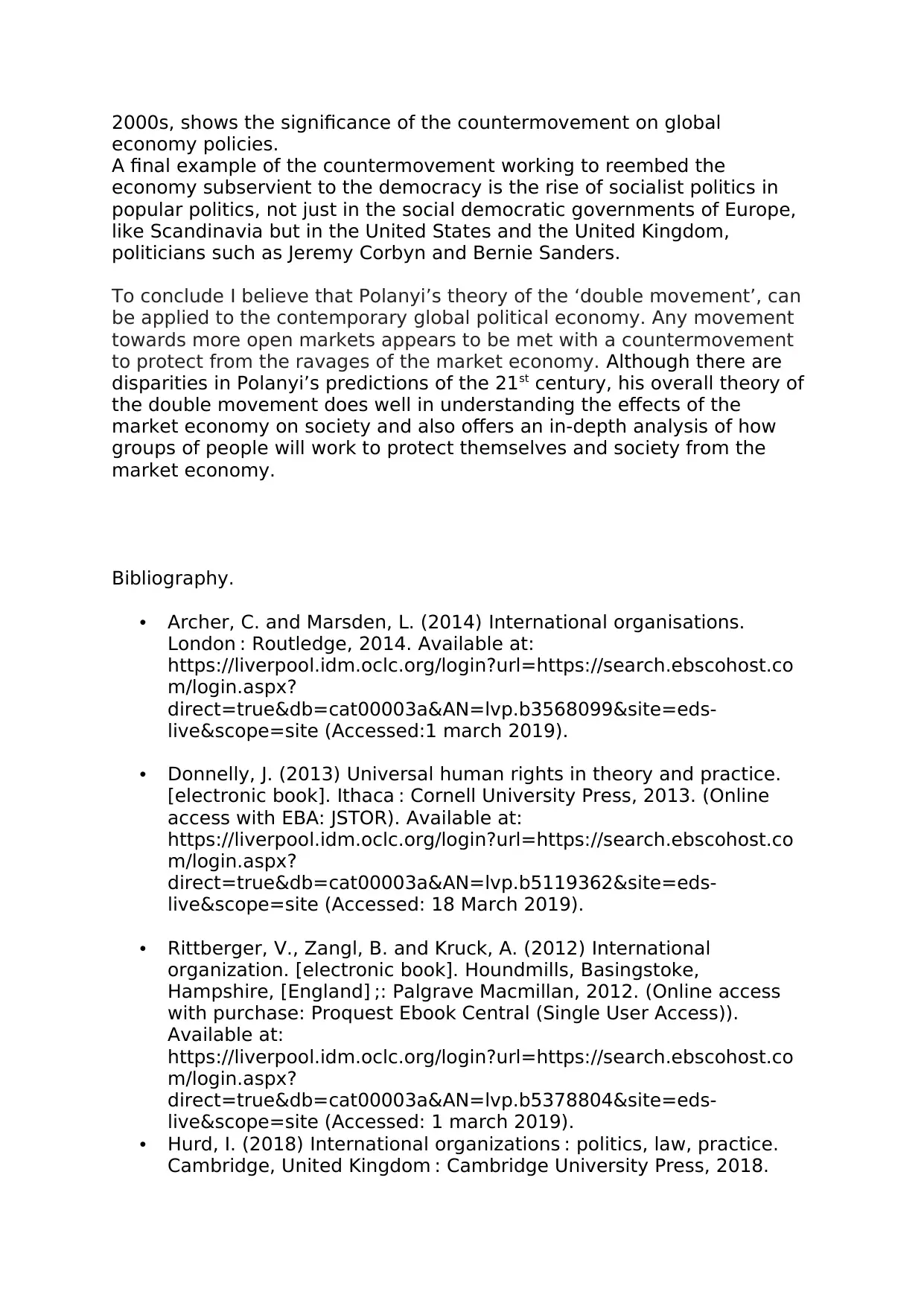
2000s, shows the significance of the countermovement on global
economy policies.
A final example of the countermovement working to reembed the
economy subservient to the democracy is the rise of socialist politics in
popular politics, not just in the social democratic governments of Europe,
like Scandinavia but in the United States and the United Kingdom,
politicians such as Jeremy Corbyn and Bernie Sanders.
To conclude I believe that Polanyi’s theory of the ‘double movement’, can
be applied to the contemporary global political economy. Any movement
towards more open markets appears to be met with a countermovement
to protect from the ravages of the market economy. Although there are
disparities in Polanyi’s predictions of the 21st century, his overall theory of
the double movement does well in understanding the effects of the
market economy on society and also offers an in-depth analysis of how
groups of people will work to protect themselves and society from the
market economy.
Bibliography.
• Archer, C. and Marsden, L. (2014) International organisations.
London : Routledge, 2014. Available at:
https://liverpool.idm.oclc.org/login?url=https://search.ebscohost.co
m/login.aspx?
direct=true&db=cat00003a&AN=lvp.b3568099&site=eds-
live&scope=site (Accessed:1 march 2019).
• Donnelly, J. (2013) Universal human rights in theory and practice.
[electronic book]. Ithaca : Cornell University Press, 2013. (Online
access with EBA: JSTOR). Available at:
https://liverpool.idm.oclc.org/login?url=https://search.ebscohost.co
m/login.aspx?
direct=true&db=cat00003a&AN=lvp.b5119362&site=eds-
live&scope=site (Accessed: 18 March 2019).
• Rittberger, V., Zangl, B. and Kruck, A. (2012) International
organization. [electronic book]. Houndmills, Basingstoke,
Hampshire, [England] ;: Palgrave Macmillan, 2012. (Online access
with purchase: Proquest Ebook Central (Single User Access)).
Available at:
https://liverpool.idm.oclc.org/login?url=https://search.ebscohost.co
m/login.aspx?
direct=true&db=cat00003a&AN=lvp.b5378804&site=eds-
live&scope=site (Accessed: 1 march 2019).
• Hurd, I. (2018) International organizations : politics, law, practice.
Cambridge, United Kingdom : Cambridge University Press, 2018.
economy policies.
A final example of the countermovement working to reembed the
economy subservient to the democracy is the rise of socialist politics in
popular politics, not just in the social democratic governments of Europe,
like Scandinavia but in the United States and the United Kingdom,
politicians such as Jeremy Corbyn and Bernie Sanders.
To conclude I believe that Polanyi’s theory of the ‘double movement’, can
be applied to the contemporary global political economy. Any movement
towards more open markets appears to be met with a countermovement
to protect from the ravages of the market economy. Although there are
disparities in Polanyi’s predictions of the 21st century, his overall theory of
the double movement does well in understanding the effects of the
market economy on society and also offers an in-depth analysis of how
groups of people will work to protect themselves and society from the
market economy.
Bibliography.
• Archer, C. and Marsden, L. (2014) International organisations.
London : Routledge, 2014. Available at:
https://liverpool.idm.oclc.org/login?url=https://search.ebscohost.co
m/login.aspx?
direct=true&db=cat00003a&AN=lvp.b3568099&site=eds-
live&scope=site (Accessed:1 march 2019).
• Donnelly, J. (2013) Universal human rights in theory and practice.
[electronic book]. Ithaca : Cornell University Press, 2013. (Online
access with EBA: JSTOR). Available at:
https://liverpool.idm.oclc.org/login?url=https://search.ebscohost.co
m/login.aspx?
direct=true&db=cat00003a&AN=lvp.b5119362&site=eds-
live&scope=site (Accessed: 18 March 2019).
• Rittberger, V., Zangl, B. and Kruck, A. (2012) International
organization. [electronic book]. Houndmills, Basingstoke,
Hampshire, [England] ;: Palgrave Macmillan, 2012. (Online access
with purchase: Proquest Ebook Central (Single User Access)).
Available at:
https://liverpool.idm.oclc.org/login?url=https://search.ebscohost.co
m/login.aspx?
direct=true&db=cat00003a&AN=lvp.b5378804&site=eds-
live&scope=site (Accessed: 1 march 2019).
• Hurd, I. (2018) International organizations : politics, law, practice.
Cambridge, United Kingdom : Cambridge University Press, 2018.
Paraphrase This Document
Need a fresh take? Get an instant paraphrase of this document with our AI Paraphraser
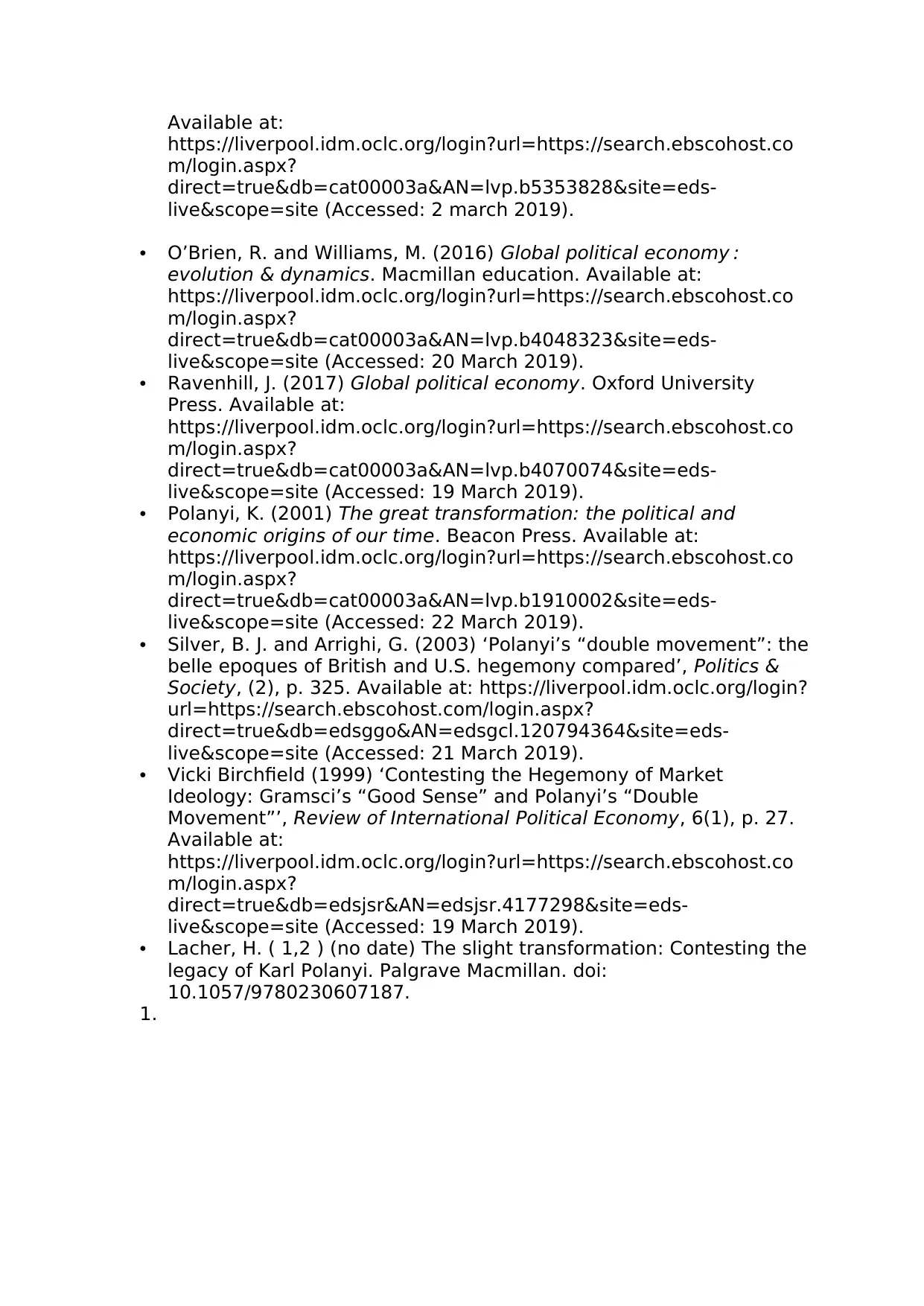
Available at:
https://liverpool.idm.oclc.org/login?url=https://search.ebscohost.co
m/login.aspx?
direct=true&db=cat00003a&AN=lvp.b5353828&site=eds-
live&scope=site (Accessed: 2 march 2019).
• O’Brien, R. and Williams, M. (2016) Global political economy :
evolution & dynamics. Macmillan education. Available at:
https://liverpool.idm.oclc.org/login?url=https://search.ebscohost.co
m/login.aspx?
direct=true&db=cat00003a&AN=lvp.b4048323&site=eds-
live&scope=site (Accessed: 20 March 2019).
• Ravenhill, J. (2017) Global political economy. Oxford University
Press. Available at:
https://liverpool.idm.oclc.org/login?url=https://search.ebscohost.co
m/login.aspx?
direct=true&db=cat00003a&AN=lvp.b4070074&site=eds-
live&scope=site (Accessed: 19 March 2019).
• Polanyi, K. (2001) The great transformation: the political and
economic origins of our time. Beacon Press. Available at:
https://liverpool.idm.oclc.org/login?url=https://search.ebscohost.co
m/login.aspx?
direct=true&db=cat00003a&AN=lvp.b1910002&site=eds-
live&scope=site (Accessed: 22 March 2019).
• Silver, B. J. and Arrighi, G. (2003) ‘Polanyi’s “double movement”: the
belle epoques of British and U.S. hegemony compared’, Politics &
Society, (2), p. 325. Available at: https://liverpool.idm.oclc.org/login?
url=https://search.ebscohost.com/login.aspx?
direct=true&db=edsggo&AN=edsgcl.120794364&site=eds-
live&scope=site (Accessed: 21 March 2019).
• Vicki Birchfield (1999) ‘Contesting the Hegemony of Market
Ideology: Gramsci’s “Good Sense” and Polanyi’s “Double
Movement”’, Review of International Political Economy, 6(1), p. 27.
Available at:
https://liverpool.idm.oclc.org/login?url=https://search.ebscohost.co
m/login.aspx?
direct=true&db=edsjsr&AN=edsjsr.4177298&site=eds-
live&scope=site (Accessed: 19 March 2019).
• Lacher, H. ( 1,2 ) (no date) The slight transformation: Contesting the
legacy of Karl Polanyi. Palgrave Macmillan. doi:
10.1057/9780230607187.
1.
https://liverpool.idm.oclc.org/login?url=https://search.ebscohost.co
m/login.aspx?
direct=true&db=cat00003a&AN=lvp.b5353828&site=eds-
live&scope=site (Accessed: 2 march 2019).
• O’Brien, R. and Williams, M. (2016) Global political economy :
evolution & dynamics. Macmillan education. Available at:
https://liverpool.idm.oclc.org/login?url=https://search.ebscohost.co
m/login.aspx?
direct=true&db=cat00003a&AN=lvp.b4048323&site=eds-
live&scope=site (Accessed: 20 March 2019).
• Ravenhill, J. (2017) Global political economy. Oxford University
Press. Available at:
https://liverpool.idm.oclc.org/login?url=https://search.ebscohost.co
m/login.aspx?
direct=true&db=cat00003a&AN=lvp.b4070074&site=eds-
live&scope=site (Accessed: 19 March 2019).
• Polanyi, K. (2001) The great transformation: the political and
economic origins of our time. Beacon Press. Available at:
https://liverpool.idm.oclc.org/login?url=https://search.ebscohost.co
m/login.aspx?
direct=true&db=cat00003a&AN=lvp.b1910002&site=eds-
live&scope=site (Accessed: 22 March 2019).
• Silver, B. J. and Arrighi, G. (2003) ‘Polanyi’s “double movement”: the
belle epoques of British and U.S. hegemony compared’, Politics &
Society, (2), p. 325. Available at: https://liverpool.idm.oclc.org/login?
url=https://search.ebscohost.com/login.aspx?
direct=true&db=edsggo&AN=edsgcl.120794364&site=eds-
live&scope=site (Accessed: 21 March 2019).
• Vicki Birchfield (1999) ‘Contesting the Hegemony of Market
Ideology: Gramsci’s “Good Sense” and Polanyi’s “Double
Movement”’, Review of International Political Economy, 6(1), p. 27.
Available at:
https://liverpool.idm.oclc.org/login?url=https://search.ebscohost.co
m/login.aspx?
direct=true&db=edsjsr&AN=edsjsr.4177298&site=eds-
live&scope=site (Accessed: 19 March 2019).
• Lacher, H. ( 1,2 ) (no date) The slight transformation: Contesting the
legacy of Karl Polanyi. Palgrave Macmillan. doi:
10.1057/9780230607187.
1.
1 out of 5
Your All-in-One AI-Powered Toolkit for Academic Success.
+13062052269
info@desklib.com
Available 24*7 on WhatsApp / Email
![[object Object]](/_next/static/media/star-bottom.7253800d.svg)
Unlock your academic potential
Copyright © 2020–2025 A2Z Services. All Rights Reserved. Developed and managed by ZUCOL.